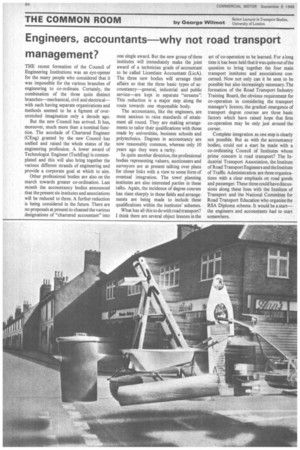Engineers, accountants why not road transport management?
Page 90

If you've noticed an error in this article please click here to report it so we can fix it.
THE recent formation of the Council of Engineering Institutions was an eye-opener for the many people who considered that it was impossible for the various branches of engineering to co-ordinate. Certainly, the combination of the three quite distinct branches—mechanical, civil and electrical— with each having separate organizations and methods seemed to be a figment of overstretched imagination only a decade ago.
But the new Council has arrived. It has, moreover, much more than a nominal function. The accolade of Chartered Engineer (CEng) granted by the new Council has unified and raised the whole status of the engineering profession. A lower award of Technologist Engineer (TechEng) is contemplated and this will also bring together the various different strands of engineering and provide a corporate goal at which to aim.
Other professional bodies are also on the march towards greater co-ordination. Last month the accountancy bodies announced that the present six institutes and associations will be reduced to three. A further reduction is being considered in the future. There are no proposals at present to channel the various designations of "chartered accountant" into one single award. But the new group of three institutes will immediately make the joint award of a technician grade of accountant to be called Licentiate Accountant (LicA). The three new bodies will arrange their affairs so that the three basic types of accountancy—general, industrial and public service—are kept in separate "streams". This reduction is a major step along the route towards one responsible body.
The accountants, like the engineers, are most anxious to raise standards of attainment all round. They are making arrangements to tailor their qualifications with those made by universities, business schools and polytechnics. Degrees in accountancy are now reasonably common, whereas only 10 years ago they were a rarity.
In quite another direction, the professional bodies representing valuers, auctioneers and surveyors are at present talking over plans for closer links with a view to some form of eventual integration. The town planning institutes are also interested parties in these talks. Again, the incidence of degree courses has risen sharply in these fields and arrangements are being made to include these qualifications within the institutes' schemes.
What has all this to do with road transport? I think there are several object lessons in the art of co-operation to be learned. For a long time it has been held that it was quite out ofthe question to bring together the four main transport institutes and associations concerned. Now not only can it be seen to be possible but also increasingly necessary. The formation of the Road Transport Industry Training Board, the obvious requirement for co-operation in considering the transport manager's licence, the gradual emergence of transport degree courses are three basic factors which have raised hope that firm co-operation may be only just around the corner.
Complete integration as one step is clearly not possible. But as with the accountancy bodies, could not a start be made with a co-ordinating Council of Institutes whose prime concern is road transport? The Industrial Transport Association, the Institute of Road Transport Engineers and the Institute of Traffic Administration are three organizations with a clear emphasis on road goods and passenger. These three could have discussions along these lines with the Institute of Transport and the National Committee for Road Transport Education who organize the RSA Diploma scheme. It would be a start— the engineers and accountants had to start somewhere.










































































































































